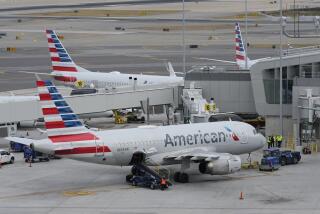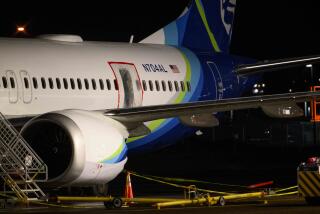Airline descends to a new low: a death fee
We all know that some airlines nickel-and-dime you with fees -- fees for baggage, fees for food, fees for blankets and pillows. But fees for death?
Monrovia resident Jane Wilkens, 48, was looking forward to a getaway to Hawaii’s Big Island this coming April with her 77-year-old mom and one of her mom’s friends. In August, she booked three first-class tickets to Kona on Hawaiian Airlines for $4,287.
But in September, Wilkens’ mom underwent surgery for a back problem. Three days later, she unexpectedly died from a blood clot.
“It was horrible,” Wilkens recalled. “She was my best friend. We were very close, and this was devastating to me.”
After dealing with all the things that arise under such circumstances, Wilkens finally got around to canceling various travel arrangements. She contacted the Hilton Waikoloa Village resort, where she’d booked a suite for about $600 per night, and explained what had happened.
“Just like that, they canceled the reservation,” Wilkens said.
She contacted Delta Air Lines, on which she’d booked a separate first-class trip for a “girls’ weekend” in Maine after she and her mom returned from Hawaii. “They fully refunded the tickets, no questions asked,” Wilkens said.
She contacted Hawaiian Airlines, which, like Delta, requested a copy of her mom’s death certificate. About a month later, Wilkens received a letter from Paul Whitaker, Hawaiian Air’s “resolution coordinator.”
He said the airline would refund each of the three first-class tickets but would deduct a $75 “service fee” per ticket, or $225.
Whitaker wrote that Hawaiian Air understood that the death of Wilkens’ mom was “an uncontrollable event,” but nevertheless believed its fees were “fair and reasonable.” He said the carrier now considered the case closed.
“I thought that was ridiculous,” Wilkens told me. “I bought those tickets nine months in advance and canceled seven months in advance. It’s not like they wouldn’t have time to resell them.
“It wasn’t the money,” she added. “It was the principle.”
As it happens, Hawaiian Air prides itself on its customer service. The carrier’s website includes a “customer service commitment” that says the airline “is committed to delivering superior service by making air travel an easy and positive experience for every customer.”
“Our passengers’ comfort is of utmost importance to us, second only to our concern for their safety,” it says. “Since 1929, our company has built an unmatched reputation for safety and hospitality.”
Hawaiian Air is Hawaii’s largest airline, serving 20 domestic and international destinations. The airline says it carries an average of 6 million passengers a year.
In October, Hawaiian Air’s parent company, Hawaiian Holdings Inc., said its quarterly profit more than doubled to $19.6 million.
Keoni Wagner, a Hawaiian Airlines spokesman, said the charge to Wilkens was “a refund fee for processing the refund.”
“There’s administration involved -- paperwork, computer entries,” he said. “The processing of the refund takes staff time that costs the company money.”
I don’t know about paperwork, but I’d be very surprised if the computer entries in such cases involved more than a few minutes of work. Let’s say it took 10 minutes per ticket to process. That means the $75 fee equates to an hourly charge of $450, or $3,600 for an eight-hour shift.
Hawaiian Air must pay its staff pretty well.
Not all carriers take such a heartless view of things. Susan Elliott, a Delta spokeswoman, confirmed that her airline does what it can to accommodate bereaved passengers -- and doesn’t ding them with processing fees if a trip has to be canceled.
“In the case of a nonrefundable ticket, we make an exception if there’s a death of the passenger or an immediate relative,” she said.
Elizabeth Merida, a spokeswoman for the Air Transport Assn., an industry group, said there are no regulations governing how an airline must treat passengers with a death in the family.
“There are variations,” she said. “Those kinds of decisions are up to individual carriers.”
Wilkens, an insurance broker, said she won’t lose any sleep about Hawaiian Air withholding $225 in dead-mom fees. But she doesn’t think people in her position should be taken advantage of.
“It’s morally wrong,” Wilkens said.
Her credit card company, American Express, apparently agreed. Wilkens said she contacted AmEx after Hawaiian Air dug in its heels. She’d used her plastic to purchase the tickets.
Last week, a response finally arrived. AmEx said it would cover Wilkens’ fees and refund the $225 to her account. She assumes the card company will use its considerable muscle to be compensated by Hawaiian Air.
“We look at everything on a case-by-case basis,” said Desiree Fish, an AmEx spokeswoman. “It comes down to customer service. Sometimes we do things as a goodwill gesture.”
One alternative in such cases is to take out a travel insurance policy that would guarantee a refund in the event of a death in the family. Such policies can run about $80 for every $1,000 in travel costs, which is kind of pricey but could provide a little peace of mind.
But should that really be necessary? If your mom has just died, you’d think any company would step up and do the right thing, especially if they want to keep you as a loyal customer.
Reaching into your pocket and plucking out $75 -- that’s just cold. Especially for an otherwise warm place like Hawaii.
Consumer Confidential runs Wednesdays and Sundays. Send your tips or feedback to david.lazarus@latimes.com.
More to Read
Sign up for The Wild
We’ll help you find the best places to hike, bike and run, as well as the perfect silent spots for meditation and yoga.
You may occasionally receive promotional content from the Los Angeles Times.







